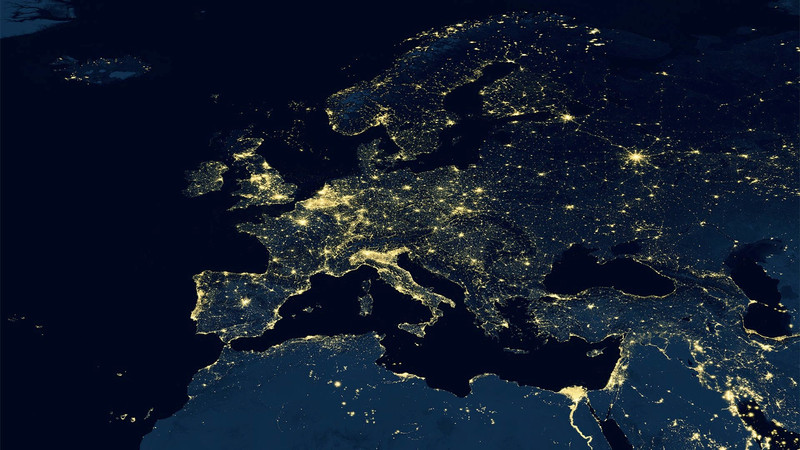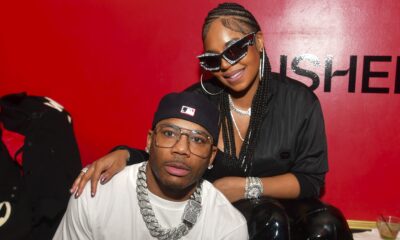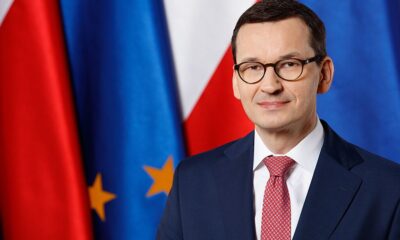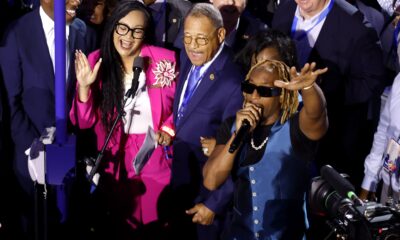Opinion
What Happened To The EU Lobbying Cleanup?

The French say that “out of the mountain…came the mouse”. Last December, the European Parliament President Roberta Metsola issued a solemn warning to the European Parliament and called for action when the news of the Qatargate affair broke.
Six months on, the collective resolve and sense of urgency have almost disappeared. Members of the European Parliament are not enthusiastic about reforming the rules which allow them to engage in significant paid activities outside of their official duties. The European Commission’s proposal for an independent EU ethics panel is also expected to fall short.
-

The EU needs to have a working transparency register. It is the most basic of all the reforms that are needed.
Maybe it was inevitable. The scandal surrounding the suitcases of cash and the dramatic fall of European politics starlet Eva Kaili were all the ingredients needed to make a spy novel. It is much more boring to focus on the ABCs of transparency and ethical standards than to point fingers at foreign interference.
EU’s Lobby Register – a haven for shady data
The EU needs to have a working transparency register. It is the most basic of all the reforms that are needed. The majority of people believe that the EU already has an effective, reliable tool to help achieve a stronger and more open European Democracy.
The EU does.
The EU Transparency Register is a searchable database that contains information on over 12,000 organisations. In the past, these organisations declared an annual lobby budget totaling EUR1.8bn. The EU’s claim of democratic transparency and accountability is only as good as the data it has collected.
The website LobbyFacts was created by the civil society organisations Corporate Europe Observatory (CEO) and Lobby Control. It allows easy searches and comparisons based on data from the register.
Here are some interesting numbers.
Who would have thought that Europe’s most aggressive lobbyists were not only found in Big Tech or consultancies but also in seemingly innocent minnows like the Danish Consumer Council, Sveriges Bussforetag, (literally, ‘Sweden’s Bus Company’), and the Norwegian Childhood Cancer Society.
Let the numbers speak for themselves: In 2021, the Danish Consumer Council had 19,75 full-time lobbyists with a budget of EUR4m. Sveriges Bussforetag only spent EUR6.5m on 7.25 lobbyists. The Norwegian Childhood Cancer Society, however, spent EUR4.5m and had 0.2 lobbyists.
Google’s transparency reports suggest that its 2021 operation was surprisingly modest, with just 6.45 full-time lobbyists and an operating budget of EUR6.5m. Google’s operation is also very efficient: it has held 326 high-level meeting with the Commission. Compare that to the three Scandinavian organisations, who have combined only one of these meetings despite having a large staff.
Corporate Europe Observatory, and LobbyControl have called this “dodgy” data problem in the EU Transparency Register. In September of last year, Corporate Europe Observatory and LobbyControl sent a complaint letter to the European Parliament and Council, requesting a clean up of implausible information. They suggested that a lot of it was due to incorrect categorisation and excessive reporting by smaller registrants.
Google vs EU transparency
The real problem today, I believe, is not the Scandinavian transparency or zeal but what Google and others are hiding. Google reported 6.45 equivalent full-time lobbyists in the same year but had over 20 staff with LinkedIn profiles indicating their job was to lobby. If they don’t do it, I wonder what they do with the rest of their time. Do they play table football?
This may seem relatively innocent. It’s not clear how large the underhanded lobbying operations of Big Tech are. As the EU debated last year the Digital Services Act and Digital Markets Act, front groups, astroturfing and other forms were hidden lobbying.
Meta ran advertising and press campaigns worth tens of thousands of euros that targeted Europe’s policymakers on social media, in Brussels and in national capitals. These campaigns were not included in the EU Transparency register, presumably because they were “advertising”, and not lobbying.
Google’s influence on Europe’s policymaking community includes everything from sponsorship deals with think tanks and academics to the entertainment of a huge network of affiliates and partners across Europe. By adding up the numbers one can doubt that the EU Transparency Register contains all the information.
Google’s EUR6.5m reported budget for lobbying would have to cover not only the remuneration and expenses of its 20+ lobbyists, but also travel and office expenses, hospitality, policy conference they regularly host and consultancy expenditures up to EUR2m. (According to LobbyFacts calculations).
The register also lists the sponsorship of more than 60 Brussels-based organizations, including Allied for Startups (as well as Amcham EU), Brussels Privacy Hub, Computer & Communications Industry Associations (CCIA), Developers Alliance, Digital Europe (DOT Europe), Interactive Advertising Bureau Europe(IAB), SME Connect and Think Young, to name a few.
Add a few more organisations in Europe, like Danish Entrepreneurs, Portugal Tech League, or Slovak Alliance for Innovation Economy. Their Google-financed activities and EU activities are conspicuously missing from Google’s transparency reports.
The numbers don’t add-up, and it’s hard to believe that the EU code of conduct, ethics and representation principles are being followed.
Fig leaf for hush hush lobbying
The sad truth is the EU Transparency Registry has become a fig leaf to cover much of the hush-hush Brussels lobbying. It’s especially aggravating that some of the influence-peddling takes place in our institutions and is legitimised.
Politico revealed recently that EU40, a platform of young members of the European Parliament is actually a “you fund me, I give access to this MEP or that” scheme. The Google-sponsored SME Connect that has led campaigns against EU tech regulations is run by former MEPs, and has 24 active MEPs on its board. One of them was Eva Kaili, until her recent impediments.
One wonders when the EU’s top politicians and institutions, who are only a year away from the next European election, will wake up. Three MEPs including the lead DSA rapporteur wrote a letter to President Metsola months before Qatargate asking him to take action on the growing fraud and influence peddling practices that undermined the trust in our institutions.
It is now 18 years since the EU’s Transparency Initiative. The biggest lobbyists in Europe (either by total turnover or lobbying budget), should be required to disclose their sponsorship and lobbying activities, project-byproject, euro-byeuro.
Instead of today’s hapless Secretariat, which is little more than an unorganized mailbox, the EU Transparency Register needs to be given proper investigative and sanctions powers.
The institutions are responsible for “maintaining an open, transparent, and regular dialogue with representatives associations” (Article 11 TEU). The Independent Ethics Body as well as the revamped EU Transparency Register can be established through an interinstitutional agreement. (Article 295 TFEU). Or, as a creative option, they can be lodged at the EU Ombudsman who has a broad mandate under the Treaty to combat maladministration in all EU Institutions, as well as full independence in its own investigative powers (Article 228 TFEU).
Now, what is needed is political will.
EU leaders have time to make the right decision before the next European elections. We should remind them what President Metsola said in her speech of December, when she staked her mandate to clean up the EU’s mess of lobbying. “Europeans prefer to be cold than purchased.”
Opinion
Why diversifying trade is the only answer to wartime food security
The argument is often made about food, as well as about dozens of other “strategic goods”, that we must be self-sufficient in the face of threats to peace around the world.
The argument itself is very old, old enough for the self-sufficiency argument, as well as the feasibility of actually being self-sufficient, to have finally graduated to the status of political myth. Yet this is, unfortunately, a myth that refuses to die. One that continuously puts European nations on the path towards fragile supply chains.
The conflict in Ukraine has disrupted Black Sea agricultural exports, pushing prices higher, and exacerbating high energy and fertilizer costs. As major exporters of grain and vegetable oil, conflict around the Black Sea is significantly disrupting shipping.
In Sudan, the combined effects of conflict, economic crisis, and poor harvests are significantly affecting people’s access to food and have doubled the number of people facing acute hunger in Sudan to around 18 million. The higher grain prices from the war in Ukraine was the final nail.
If fighting in Gaza escalates across the Middle East, (which, fortunately, is looking less likely) it could spark a second energy crisis which could send food and fuel prices spiralling. The World Bank warned that if the conflict were to intensify, it could result in significant price hikes for oil and exacerbate food insecurity, both within the Middle East and globally.
It should be obvious that the most secure food supply, steel supply or fuel supply is one that draws from as many sources as possible, so that if one dries up, or is caught up in a military or diplomatic calamity, then the supply is able to be recovered by increasing trade through the many alternative channels. Its how Qatar, cut off during the blockade in 2017, was able to continue largely unaffected despite being shut off from all its neighbours and producing itself almost no food at all.
The myth’s enduring popularity largely is down to the way it interacts with our basic human psychology. Most of our mental heuristics are learn for much more simplistic problems. The way we’ve learnt to survive is by hoarding and sitting on as large a pile of food as possible. We’re also naturally disinclined to trust our neighbours, let alone rely on them.
Breaking though our prehistoric instincts and embracing what are therefore the counter-intuitive tenets of free trade is thus quite a tall order. Perhaps it explains why free trade remains so unpopular compared to protectionism despite the overwhelmingly positive record that free trade can claim for itself, singlehandedly lifting billions out of poverty.
Convincing the current generation of European politicians to diversify their food supply will always be hard – but the gains are massive if they can see the light.
Regions like Latin America and Southeast Asia stand out as regions where the EU does far too little strategic trade. Being in different hemispheres means that the seasons are opposite (or have massively different climates in the case of Southeast Asian countries like Malaysia), so the benefits to mutual supply chains are naturally complementary. Such countries are primed for mutually beneficial trade to boost strategic security.
Countries like Argentina produce large amounts of meat, something the EU sanitary and phytosanitary rules (SPS) make much more difficult to import than it need be. Malaysia is the world’s largest exporter of palm oil, producing the oils and fats needed across dozens of food categories. Compared to other main oilseeds, such as soybean, rapeseed, and sunflower, which can be grown domestically, oil palm is the highest-yielding oil crop. Making it cheaper and easier to import would mean food security in times of instability, and cheaper staples in times of peace by driving down costs.
More trade also means more influence and more transparency in supply chains. Taking the Malays as an example again, their agrifood industry is embracing the use of blockchain technology and traceability to prove that their products are environmentally friendly and deforestation-free. Trade makes economically viable massive environmental efforts to protect the environment. Conversely, it creates interdependence with regions around the world which reduce the likelihood of conflict or international rulebreaking generally.
The great French economist Frédéric Bastiat wrote that ““When goods don’t cross borders, Soldiers will”. He observed the power of interdependence as a peacekeeper. Diversifying trade is therefore both preparation and prevention. Politicians must overcome their primitive instincts and let the goods flow.
Opinion
Why Israel is wrong to accuse Qatar of developing Hamas
For the past few days, the Israeli Prime Minister has been focusing his criticism on Qatar, not knowing where to turn and, above all, in the face of a flood of worldwide criticism of his hard-line strategy in Gaza and the way out of the war. He even recently accused Doha of being indirectly responsible for 7 October. While Qatar has been manoeuvring to negotiate with the Islamist organisation for the past three months, it is also endangering the hostages, many of whom are still being held in Gaza.
Quite surprising to now accuse Qatar of bearing the burden of what is happening, even though Netanyahu acknowledged in 2019 that it was important to support Hamas in order to continue to weaken the Palestinian Authority and prevent the creation of a Palestinian state. Bibi’s policy has always been to deal with the Islamist organisation to the detriment of Abbas’s Palestinian Authority. The division of power between the West Bank and the Gaza Strip was the perfect tool to condemn the formation of a Palestinian state.
Netanyahu’s absurd attack on Doha when we know that the Hebrew state helped support Sheikh Yassin, its founder, in 1988, always with the aim of dividing the Palestinians as much as possible. Despite its anti-Jewish doctrine, Israel has supported the development of the most radical branch of the Muslim Brotherhood and has played with fire. Just as the Americans supported the Afghan Mujahideen against the Soviets, the Hebrew state thought it could use a few bearded men to weaken Yasser Arafat’s Fatah for good. Charles Enderlin, former France 2 correspondent in Israel, has published a number of articles and books explaining the complacency of the Israeli right towards Hamas, the emergence of which would certainly doom a future state for the Palestinians once again.
Finally, it’s absurd when you consider that Qatar has been harbouring Hamas leaders at the request of the Americans (and Israelis) so that it can negotiate the day they are needed. And since 7 October, alas, that day has arrived in an attempt to save the lives of almost 140 Israeli hostages still being held by Hamas in Gaza. Today, however, the powerless international community is trying to bring about a ceasefire and a halt to bombing in Gaza after the deaths of nearly 25,000 Gazans, mostly women and children, since mid-October.
If no lasting political solution emerges from the military response to Israel’s worst attack in decades, following the deaths of nearly 1,400 people in Israel in 48 hours, then once again a temporary solution will be adopted that will have to last, to prevent the Israelis and Palestinians of Gaza from killing each other to the last man. And in any case, it is unlikely to be the creation of the Palestinian state that the Israeli government still does not want. Even less so today, even if it would perhaps be the first guarantor of the security of the Jewish state.
Who can help put an end to the noise of weapons and get diplomacy back on track in the Middle East? The United States and Europe are still trying, with the support of Egypt and Qatar, which Netanyahu is suddenly criticising in order to absolve himself of his major responsibility. In a general geopolitical context in which the major Western powers are increasingly marginalised as peacemakers, as are the major international organisations that are supposed to ensure respect for international law, it is above all the regional powers that for several years have been regaining control of their zone of influence or putting forward their talent as peace mediators to have a say in the concert of nations in crisis or at war. As far as the conflict between Israelis and Palestinians is concerned, the United States, which for years has been disengaging from Middle Eastern conflict zones, can do little, especially as Joe Biden’s term of office, which is irrevocably drawing to a close, further weakens his capacity for influence and action, if his administration has had any over the last three years. The European Union, mired in the Ukrainian crisis, has long since lost its diplomatic capacity and remains forever a political dwarf in the cacophonous symphony of world powers. That leaves Egypt and Qatar above all. Traditionally, Egypt, which has been at peace with Israel since 1977 and the Camp David Accords, has always managed in recent years, since the arrival of President Sissi, to negotiate a pause in hostilities between Israel and Gaza. Cairo’s relations with the Hamas movement are cordial and enable it to reconcile its points of view with Tel Aviv on each occasion.
The player that can probably make the most of the situation, and in the continuity of what it has been doing for years, from the Horn of Africa to Afghanistan, is Qatar, which has had a relationship with Israel for a long time, something that Netanyahu forgets. Qatar’s proximity to these Islamist movements, such as the Taliban at the time of the negotiations with the Americans in 2018, is a key asset for Doha. It dates back precisely to the time when Washington asked the Emirate to keep an eye on its leaders. With the American base at Al Oudeid, the largest American off-ground base in the world, Doha saw its capacity to one day monetise this “service rendered” for its credibility and its de facto proximity to the enemies of many, and to see itself emerge as a key regional peace mediator.
Originally published at Info-Today.eu
Africa
Senegal February 2024, When a statesman steps down in Africa
The presidential election in Senegal is already noteworthy before it even happens on 25 February 2024. This is because President Macky Sall told the world last summer that he would be stepping down and would not run in the election, thereby fully respecting the end of his constitutional term. As he put it, he has great faith in the country and its people to continue after his presidency. His stance is in striking contrast to the current trend on the continent for military coups and presidents clinging on to power long after their constitutional terms have ended.
In an interview with Africa Report, President Sall said:
“Senegal is more than just me, it’s full of people capable of taking Senegal to the next level. Personally, I believe in hard work and keeping one’s word. It may be old-fashioned, but it’s worked for me so far and I don’t see why I should change my nature.”
He added,
“The real issue is the conditions under which African countries are forced into debt, at high rates. Above all, unlike other countries, we are unable to obtain loans for more than 10 or 12 years, even when we want to build a hydroelectric power station to combat global warming … That’s the real struggle for Africans.”
As for his own resignation, he said,
“You have to know how to turn the page: I’ll do what Abdou Diouf did and retire completely. Then I’ll see how I can redeploy my energies, because I still have a bit [of that] left, by the grace of God.”
There is speculation that he will be offered several prestigious roles, especially around giving an international voice to Africa. In particular, his name has been associated with the African Union’s newly acquired seat at the G20.
He is active in debates about global governance, including financial governance, and vocal about what he believes are necessary reforms of the Bretton Woods institutions. He is also a powerful voice on climate change, emphasising that Africa’s share of global pollution is less than four percent and that it is unjust to tell the African continent it cannot use fossil fuels or have them financed.
He is expected to be called upon for peace-making roles and is considered a favourite for the prize of $5m that Mo Ibrahim awards to an Africa leader who has demonstrated good governance and respect for term limits. Some of these roles are already being granted.
The OECD and France named him in November 2023 as the 4P’s (Paris Pact for People and Planet) special envoy from January. The statement said President Sall’s personal commitment will play a decisive role in mobilising all the players of goodwill and signatories to the 4P.
President Sall’s legacy on the international stage, including his former role of Chair of the African Union, is well-respected. He has championed the cancellation of African debt and strengthening the fight against terrorism. He has also been influential in his rejection of the military coups that have taken place in Africa since 2020 and the efforts to reverse them.
Of course two of the earlier coups were in Mali, Senegal’s biggest trading partner. These were followed by a coup in another neighbour, Guinea, and a failed attempt in next-door Guinea-Bissau. President Sall was chair of the African Union when a coup struck in Burkina Faso for the second time within 2022. He played a leading role in the response of the Economic Community of West African States (ECOWAS) to every coup, including one in Niger in July.
As head of the African Union last year, he drove efforts to broker the Black Sea grain deal that has allowed crucial shipments of Ukrainian grain to reach African countries despite the Russian invasion. He is also appreciated for his role in forcing out dictator Yahya Jammeh in neighbouring Gambia in 2017.
As for Senegal’s future, President Sall said,
“We are on the right track, despite the crisis linked to the Covid-19 pandemic and the effects of the war in Ukraine. After spending the last decade filling in the gaps in infrastructure, electricity, and water, we need to encourage the private sector to invest more in our country so that, in the future, the state can focus more on social issues, agriculture and food sovereignty.”
Senegal’s reputation as a democracy has only been further cemented by President Sall’s willingness to step down and his instruction to his government to ensure free and transparent elections on 25 February 2024 and a smooth transition. It is to be hoped that this example will inspire a better year ahead across the continent, in terms of democracy and respect for the rule of law and term limits.
-

 EU & the World2 days ago
EU & the World2 days agoAshanti & Nelly Welcome First Child Together & Reveal Baby Boy’s Name
-

 Politics2 days ago
Politics2 days agoPoland’s Former Prime Minister Mateusz Morawiecki Eyes Leadership of European Conservatives and Reformists
-
EU & the World2 days ago
Mike Lynch Yacht Update: Fifth Body Recovered Off Coast of Sicily
-

 EU & the World2 days ago
EU & the World2 days agoDoes Travis Kelce Appear in Swift’s ‘I Can Do It With a Broken Heart’ Music Video?
-

 EU & the World2 days ago
EU & the World2 days agoLil Jon Brings the House Down at the 2024 DNC With ‘Turn Down for What’
-

 Health & Society2 days ago
Health & Society2 days agoSexual abuse, electric shocks, chemical restraints in Mental Health Care, report finds
-
Travel3 days ago
Southern European tourists flock to Denmark to escape the heat
-
Travel2 days ago
New Brussels to Venice night train: The 9 cities en route, what it will cost and how to book








